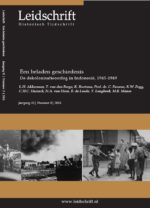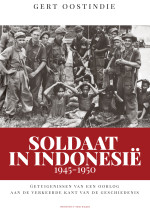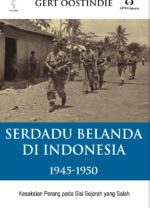Independence, decolonisation, violence and war in Indonesia, 1945-1950 is a large-scale, joint inquiry carried out by KITLV, the Netherlands Institute for Military History (NIMH) and the NIOD Institute for War, Holocaust and Genocide Studies. The project has been made financially possible by the Dutch government, due to its decision on 2 December 2016 to lend its support to a broad inquiry into the events of this period.
The programme comprises nine subprojects and aims to answer questions regarding the nature, extent and causes of structural transborder violence in Indonesia, considered in a broader political, social and international context. In this context, detailed attention will be paid to the chaotic period spanning from August 1945 to early 1946 – often referred to as the Bersiap – and the political and social aftermath in the Netherlands, Indonesia and elsewhere.
KITLV will be responsible for the synthesis and will carry out the three subprojects Societal aftermath, Regional Studies and Violence, Bersiap, Berdaulat: 1945-46 Transition. For the last two projects the group, together with Indonesian colleagues, will carry out research in several Indonesian regions. These subprojects will be the continuation of the KITLV-project Dutch military operations in Indonesia 1945-1950 that has run since 2012.
The programme has a strong international character. There will be cooperation with researchers from Indonesia and other countries involved. More than previously was the case, sources originating from Indonesia, Australia, United Kingdom and the United States (United Nations) will be used. Furthermore, the programme explicitly includes the opportunity for witness accounts from the Netherlands and Indonesia to be presented. Witnesses can come forward themselves or will be traced by researchers, in order to allow them to document their personal accounts for future generations.
For more information see: http://www.ind45-50.org/en
For questions or information please contact Ireen Hoogenboom ([email protected])
Gert Oostindie (project director)
Ireen Hoogenboom (project coordinator)
Esther Captain (researcher)
Onno Sinke (researcher)
Roel Frakking (researcher)
Martijn Eickhoff (researcher)
Anne-Lot Hoek (researcher)
Anne van de Veer (researcher)
Hans Meijer (researcher)
Meindert van der Kaaij (researcher)
Tom van den Berge (researcher)
Christiaan Harinck (researcher)
Bart Luttikhuis (researcher)
Harry Poeze (advisor)
Henk Schulte Nordholt (advisor)
Fridus Steijlen (advisor)
Fynn Franke (research assistant)
Daanjan Wisselink (student-assistant)
‘Onze vergeten slachtoffers: Wie telt de Indonesische doden?’. Bart Luttikhuis, Nico van Horn en Christiaan Harinck. De Groene Amsterdammer, 26 juli 2017.
‘Voorbij het koloniale perspectief: Indonesische bronnen en het onderzoek naar de oorlog in Indonesië, 1945-1949’. Bart Luttikhuis en Christiaan Harinck. Low Countries Historical Review 132-2: 51-76, 2017.
Een beladen geschiedenis; De dekolonisatieoorlog in Indonesië, 1945-1949. Harinck, Christiaan en Bart Luttikhuis (eds). Leidschrift 31-3, 2016. Met bijdragen van Lotte Akkerman, Tom van den Berge, Kimberley Bootsma, Cees Fasseur, K.W. Fogg, Christiaan Harinck, Nico van Horn, Bente de Leede, Y. Langkeek, Bart Luttikhuis en Maarten Manse.
Serdadu Belanda di Indonesia 1945-1950. Kesaksiaan perang pada sisi sejarah yang salah, by Gert Oostindie in cooperation with Ireen Hoogenboom and Jonathan Verwey. Translated by Maya Liem, Susi Moeimam and Nurhayu Santoso. Obor, 2016.
Soldaat in Indonesië 1945-1950: Getuigenissen aan de verkeerde kant van de geschiedenis by Gert Oostindie in cooperation with Ireen Hoogenboom and Jonathan Verwey. Prometheus, 2015.
– List of published ego documents (additional information Soldaat in Indonesië)
– Analysis of the composition of the Dutch military in Indonesia 1945-1950 (additional information Soldaat in Indonesië)
– Tables and charts (additional information Soldaat in Indonesië)
‘Juridisch afgedwongen excuses: Rawagedeh, Zuid-Celebes en de Nederlandse terughoudendheid’. Bart Luttikhuis. Low Countries Historical Review 129-4: 92-105, 2014.
‘Digging up the Dutch colonial past’
new mandala, 27 april 2017.
‘Onderzoek dekolonisatie Nederlands-Indië’
EenVandaag, 18 april 2017.
‘4,1 miljoen voor onderzoek dekolonisatieoorlog Nederlands-Indië’
Universiteit Leiden, 2 maart 2017.
‘Nieuw, vierjarig onderzoek naar dekolonisatie Indonesië’
Trouw, 24 februari 2017.
‘Onderzoek naar dekolonisatie Indië gaat vier jaar duren’
NRC, 23 februari 2017.
‘Stand van zaken Backpay’
Java Post, 16 februari 2017.
‘Brandende kampongs, brandende kwesties?’
Indisch Anders, 12 januari 2017.
‘Boekbespreking: Het buitensporig geweld in Indonesië’
Internationale Spectator, december 2016.
‘De brandende littekens van de doofpot’
Onderzoek Uitgelicht, jaargang 5-2, 2016.
‘Een discussie zonder eind, of een prematuur einde van de discussie?’
Cogiscope, 0416, 2016
‘Hoe gekleurd zijn jullie archieven?’
de Volkskrant, 29 december 2016.
‘Nederlandse regeringen volledig op de hoogte’
Solidariteit, 25 december 2016.
‘Maar wisten we dit niet al eerder?’
Java Post, 21 december 2016.
De noodzaak van erkenning: Beeldvorming rond ‘Indonesië’ sterk in beweging
KLEIO 7, 2016.
Leidschrift heeft een neus voor controverse
Leidsch Dagblad, 20 december 2016.
Penelitian Menyeluruh Kekerasan Serdadu Belanda di Indonesia
Historia, 6 december 2016.
‘Onderzoek naar geweld Nederlanders tijdens Bersiap’
EenVandaag, 6 december 2016.
‘Indonesiërs willen ook nuance in onderzoek dekolonisatieoorlog’
Universiteit Leiden, 5 december 2016.
Reizen met een steen in de schoen
NRC, 3 december 2016.
Nieuw onderzoek naar dekolonisatie Indië
NRC, 2 december 2016.
Het komt er eindelijk: een breed onderzoek naar geweld tijdens de dekolonisatie
Trouw, 2 december 2016.
Kabinet akkoord met groot onderzoek naar geweld Indië
de Volkskrant, 2 december 2016.
Kabinet laat dekolonisatie Nederlands-Indië onderzoeken
NOS, 2 december 2016.
Helden met bloed aan hun handen
NRC, 4 november 2016.
Extreem geweld in Nederlands-Indië was structureel’
Nieuwsuur, 29 september 2016.
Geruchtmakende studie nu ook toegankelijk voor Indonesiërs
Trouw, 10 september 2016.
Radio 1, 15 augustus 2016.
de Volkskrant, 15 augustus 2016.
OVT, 24 april 2016.
‘Nederlandse soldaten in Indonesië, 1945-1950’
Historiek, 10 februari 2016.
‘Oorlogsmisdaden in Indonesië: Structureel geweld tijdens de onafhankelijkheidsoorlog’
Historisch Nieuwsblad, 31 januari 2016.
‘Een kroniek van ontkenning en onthulling’
De Groene Amsterdammer, 14 januari 2016.
‘Wij kwamen niet om te doden’
Geschiedenis Magazine 50:8, nov/dec 2015.
‘Als vrijheidstrijder gestuurd, als misdadiger afgeserveerd‘
NRC, 27 november 2015.
‘Nieuwe beelden van de vuile oorlog in Indië’
Vrij Nederland, 21 november 2015.
On the 8th and 9th of September 2016 KITLV organised a CLARIAH workshop on Digital Humanities, led by Stef Scagliola (for more information see Stef’s blog), with the goal of bringing scholars together and teaching them how to apply a number of basic digital tools. Specialised instructors had been invited to present a tailor-made introduction and create a number of assignments on the following topics: visualisations, linked data, text mining and crowdsourcing. The KITLV-database with military memoires of Dutch veterans who fought in the Indonesian decolonisation war was used as a dataset to show examples and complete assignments for these four digital methods.
See the presentations of the workshop on Vimeo: Digging into military memoires.
Cooperation with Indonesian researchers
by Henk Schulte Nordholt
Why Dutch socialists failed to facilitate a peaceful decolonization of Indonesia
by Henk Schulte Nordholt
Indonesia 1945-1949
by Gert Oostindie
Looking back at a shared history: New perspectives, yes please!
by Ireen Hoogenboom
Listening to testimonies of war crimes
by Wies Bakker and Paula Hendrix
Talking about Dutch war crimes with Indonesian audiences
by Gert Oostindie
100.000: the magic victim number
by Bart Luttikhuis
The Peristiwa of Rengat
by Anne-Lot Hoek
Secrets of the Deep Sea: An ocean of archives for us to explore
by Bente de Leede, Lotte Akkerman and Kimberley Bootsma
War crimes in Indonesia and the suspicion of veterans
Gert Oostindie
The trees of Bronbeek
by Christiaan Harinck
Domestic worries of Soekarno and Fatmawati
by Harry Poeze






